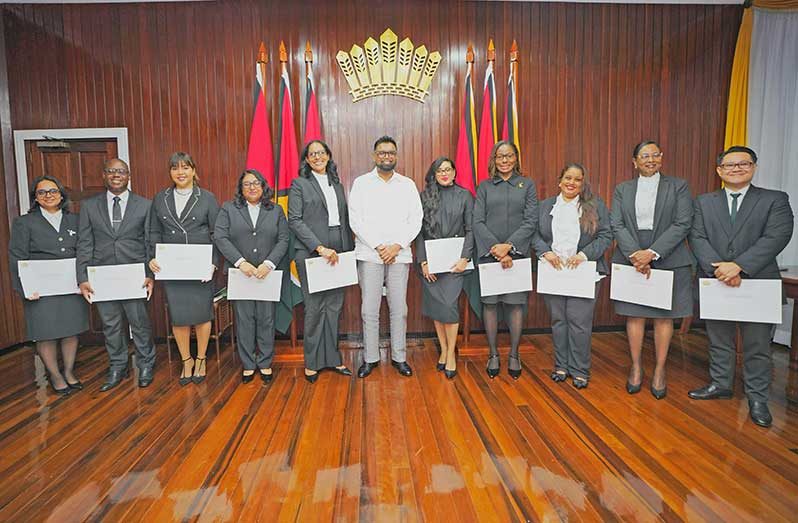– a moment of global positioning for Guyana’s judiciary – President Ali says
CITED as a moment of global positioning for Guyana’s judiciary, 10 persons were on Wednesday sworn in as puisne judges, representing the largest batch of new judges since Guyana’s independence.
At a swearing in ceremony which was held at the Office of the President, Nicola Pierre, Joy Persaud-Singh, Hessaun Yasin, Sherdel Isaacs-Marcus, Deborah Kumar-Chetty, Nigel Niles, Peter Hugh, Priscilla Chandra-Hanif, Jacqueline Josiah-Graham and Zamilla Ally-Seepaul all took the Oath of Office before the Head of State.
During his address to the newly sworn in judges, President Ali took the time to highlight that eight of the 10 judges who took the oath are women and, with this addition, in the country’s judiciary, 70 per cent are women.
“Today with this addition we are now a judiciary of which 70 per cent of our judges who comprise the judiciary making us today perhaps and just one fact check remains, the judiciary in the world with the largest participation of women,” Dr Ali says.
Further to this, he said that the ability of women and their elevation in society should not be accidental or should not be filling statistical gaps as women are highly capable and competent.
Meanwhile, speaking directly to the newly appointed judges, President Ali reminded them that practice and application of theory is going to be a new dimension of their job and work that would test their capability, character and resilience.
As such, he noted that as the oath would suggest, they are called on now to separate personal sentiments in dealing with judgements and cases that are before them.
President Ali said, “The first thing you have to learn is to separate your personal feelings or sentiments about anyone, any issue and once you learn to do that then you will respect the issue at hand, you will respect the circumstances at hand and you are able to make a more deliberate judgement.”
Against this backdrop, Dr Ali said that they are now part of a tradition that is looked up to in a special way as the way they write and rule is not only for a moment in time but also constitutes precedence.
“If you do what you are called upon to do with a great sense of responsibility, with critical thinking with the fullest application of the law, with transparency and openness, then what you do forms precedence,” the Head of State added.
This, he added is what keeps the judicial system going as the set precedence forms best practices that others would use and quote for other judgements in similar cases and as such they should aspire to set the precedence in their rulings that judges in other jurisdictions reflect upon because they find merit and strength in these judgements.
Further to this, Dr Ali told the new judges that their rulings and written judgements must withstand academic and historical scrutiny. As such, they must be confident to ensure that it withstands every aspect of scrutiny.
The future of the judiciary
President Ali highlighted that it is important that as judges they also have an appreciation for national development.
In their roles, he indicated they will see cases that would not have been brought some 20 or even 30 years ago because of the development trajectory of the country.
“You will have cases in oil and gas, maritime cases because of the changes and dynamism of the economy itself and the country and the changes that are taking place around the country itself, the financial architecture…” he said.
With the positioning of the country and the establishment of new trade relationships and bilateral relationships, the judiciary he said must be aware of all of this.
He went on to add that they are coming into the country’s judicial system at a time when there is great investment being placed into the Judiciary with the modernisation of infrastructure and the use of technology among other things.
While he noted that attorneys will have to contend with developing special skills to articulate their points digitally, judges would have to decipher what are artificial intelligence-generated arguments rather than arguments based on law.
“We have seen already cases where AI has been misused so that gives you an added burden in today’s environment because you have to have this ability of deciphering what is before you,” he said.
Against this backdrop, the head of state urged that they have an important responsibility to have a continuous passion for knowledge as it is this passion for knowledge that will enable them to have the ability to remain relevant.
These 10 judges according to the Judicial Service Commission were selected after an interview process with which 37 persons applied to fill the post.



.jpg)









